Imagine, if you will, a person drawing the strength of the universe into them, becoming surrounded in a red-orange burst of energy that signals some form of power-up seen only in superhero movies.
This could be you.
You can’t literally gain superpowers, of course, but you can drastically increase your strength, energy levels, endurance, resilience, and overall ability to power through life with a compound that causes a very similar red-orange appearance among those who harness it.
That compound is a carotenoid called astaxanthin.
I guarantee you’ve seen it — krill, shrimp, crab, and salmon are all rich sources of astaxanthin that pigments their flesh and shells with a red-orange hue. The primary natural source, however, for both these creatures and our supplements, is the microalgae Haematococcus pluvialis, which produces astaxanthin to protect its cells from oxidative stress [1].
When we eat astaxanthin, we get these effects too. When we eat astaxanthin, we are protecting ourselves from oxidative stress and the fallout it can cause. My goal with this article is to show you how regularly consuming astaxanthin can power you up to superhuman health.
Mitochondrial Protection From Oxidative Stress
Have you ever heard of that phrase, “you are what you eat?” It was never meant to be taken literally, but instead metaphorically communicate how our health and wellbeing are impacted by our dietary choices. I don’t think there’s a better example for this than carotenoids.
Humans have developed a really cool system of incorporating dietary carotenoids directly into cell membranes as a means of preventing membrane oxidation and increasing membrane fluidity [2]. Astaxanthin is particularly good at this because of its unique polar structure that allows it to cross the entire cell membrane [3].
NTFactor® Phospholipid Complex
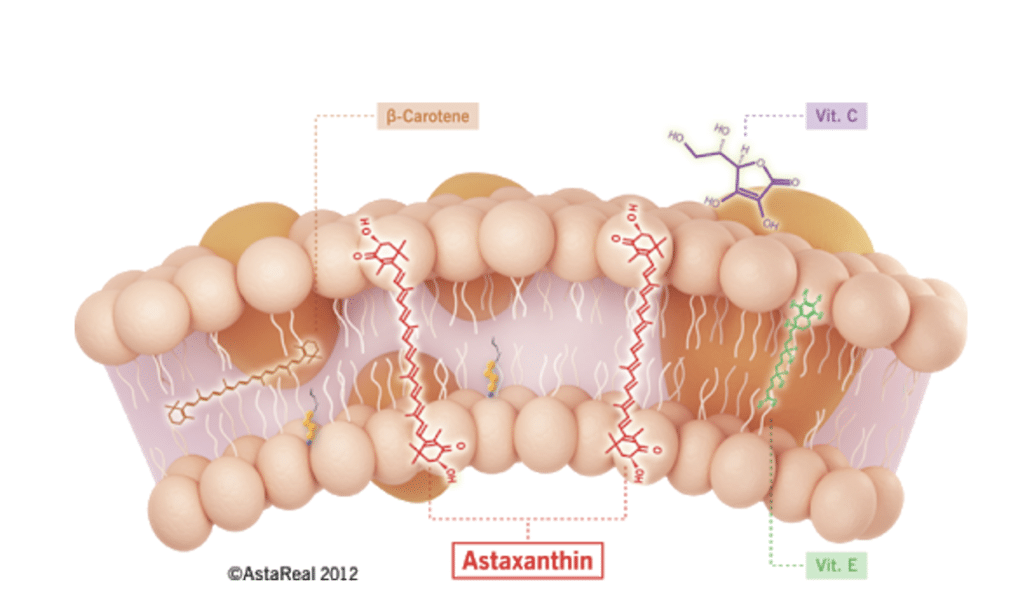
When reactive oxygen species interact with the cell membrane, be it from inside or outside the cell, astaxanthin can intervene and protect the membrane from oxidative stress. You can’t get this efficiency with most other carotenoids or common antioxidants.
For example, β-carotene floats around inside cell membranes and can’t protect them until the oxidative stress has already breached the perimeter, vitamin E can protect only one side of the cell membrane, and vitamin C can’t penetrate the cell membrane to protect it at all.
On top of all that, astaxanthin is a far more potent antioxidant molecule than vitamin E and other carotenoids like β-carotene, lycopene, and lutein [4]. Compared to astaxanthin, these other cell membrane antioxidants have only 15–69% of the ability to prevent membrane peroxidation.
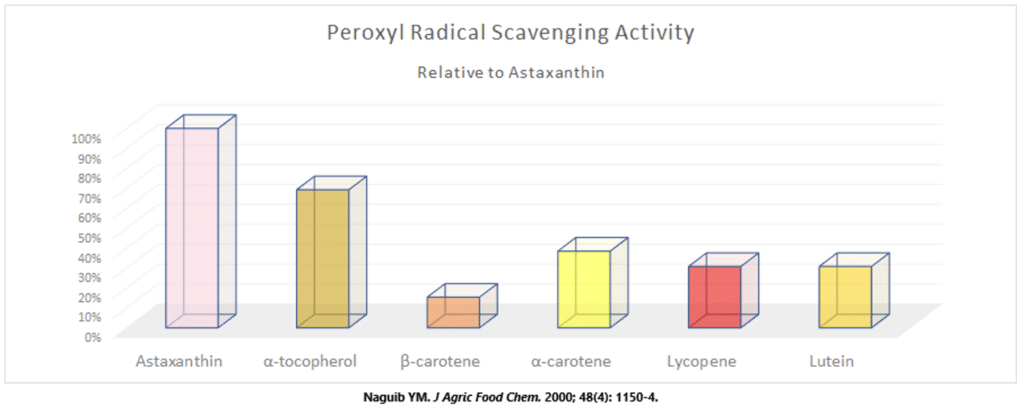
In clinical trials, astaxanthin supplementation has been shown to normalize levels of oxidative stress in those with obesity. Specifically, just 3 weeks of supplementing with 5 mg of astaxanthin reduced oxidative stress and increased antioxidant status to levels seen in those at a normal body weight [5].
Ultimately, astaxanthin’s polarity and antioxidant properties have afforded it a powerful ability to prevent mitochondrial dysfunction and increase cell survival rates in the face of oxidative stress [6–8], which in turn make it an incredibly powerful nutrient for preventing the development and progression of numerous metabolic diseases and aging processes [3,9].
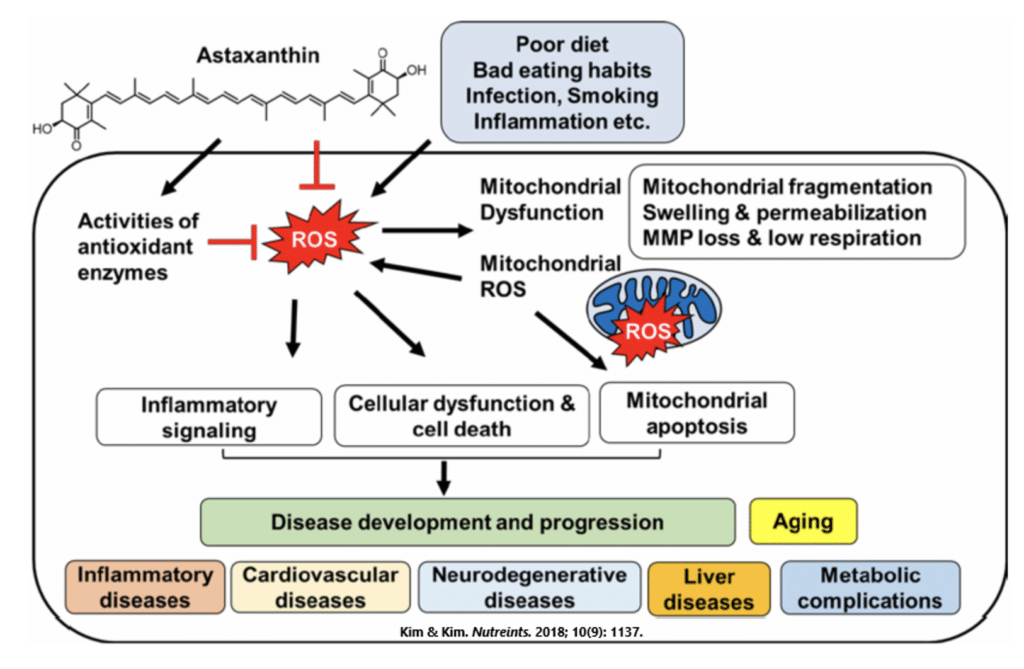
Youthful and Resilient Skin
One of the best examples of where astaxanthin can bestow superhuman levels of resilience to oxidative stress is with our skin cells. Our skin barrier is constantly being assaulted by things like solar radiation and air pollution, which are known to damage it and cause signs of premature aging.
I think we can all agree that having weak and wrinkly skin is something best avoided.
It’s well-established that carotenoids concentrate in the skin and provide a natural defense to these environmental insults through their antioxidant, anti-inflammatory, and light absorbing properties [10]. A diet rich in plants that naturally provide these carotenoids can go a long way towards maintaining youthful skin.
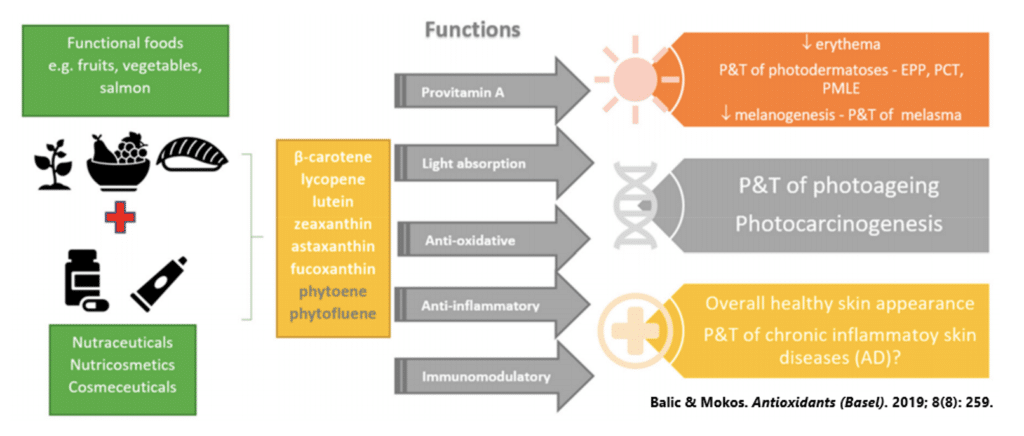
In particular, there’s been a growing, evidence-based rationale for supplementing with astaxanthin to improve skin health, particularly because skin cells preferentially accumulate astaxanthin over other carotenoids like β-carotene [11].
To quote a comprehensive review on the topic [12]:
Due to its involvement in diverse biological activities, [astaxanthin] is a promising compound in the field of dermatology… Astaxanthin inhibits collagenases, [matrix metalloproteinase] activity, inflammatory mediators, and reactive oxygen species induction, resulting in potent antiwrinkle and antioxidant effects. Moreover, [astaxanthin] may prevent UV-induced immunosuppression.
Several studies have shown that just 4–12 mg/d of astaxanthin for 1–3 months increased the skin’s resilience to UV-induced damage [13], reduced levels of oxidative stress [14], inhibited the deterioration of skin cells [14], and improved parameters of skin aging like wrinkling and hydration [13,15,16].
Muscular Strength and Endurance
Another area where astaxanthin can provide superhuman benefits is towards our physical strength and perseverance. This benefit is particularly important for those of you who are growing older and having more trouble being as active as you were back in the day.
Oxidative stress and mitochondrial dysfunction are well-established deterrents of healthy muscle tissue. If your mitochondria can’t function properly and your body can’t quell oxidative damage, then your muscle mass and function will deteriorate.
Astaxanthin can be immensely therapeutic in this situation by helping to reduce oxidative stress, increase anabolic signaling, restore mitochondrial function, and prevent muscle loss [17]. Ultimately, it can help prevent the age-associated loss of muscle mass and function we call sarcopenia.
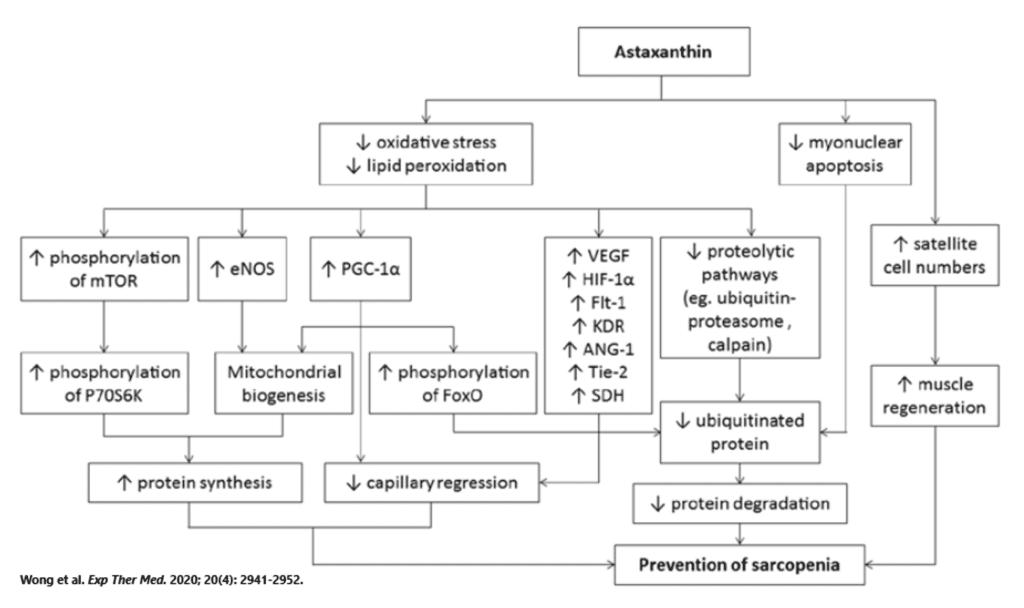
For example, in elderly adults undergoing a walking fitness program for 4 months, supplementing with 12 mg of astaxanthin increased maximal strength by 14%, muscle size by 3%, and force production by 12% compared to a placebo [18].
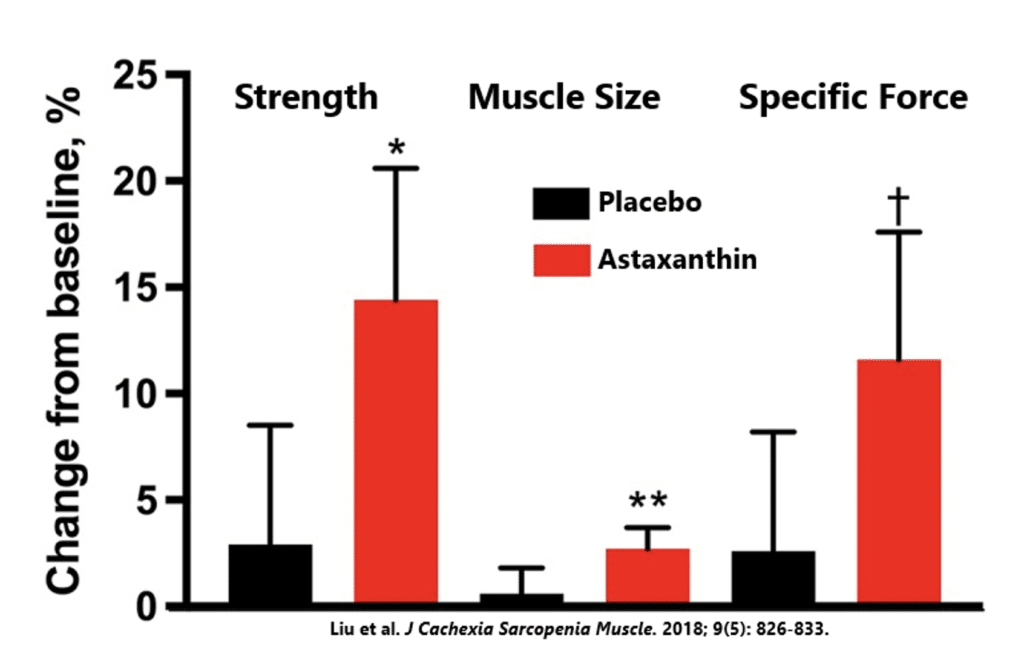
If you’re someone struggling with chronic fatigue or other conditions that make moving around and exercising difficult, then astaxanthin could be the saving grace you need to maintain your muscle mass and energy levels.
Similar benefits have been observed in young adults too. Recreationally active college students who supplement with 4 mg of astaxanthin per day increase their muscular endurance by 3-fold compared to the placebo group [19]. Basically, both groups had to squat as many times as possible with a 95-lb barbell. Those receiving astaxanthin increased their total squats from 49 to 76 repetitions, a 55% increase, while the placebo group only went from 46 to 55, a 20% increase.
Lastly, other studies have found that astaxanthin helps prevent the decrease in antioxidant defenses that occur from prolonged endurance exercise in elite-level soccer players and helps improve endurance exercise recovery in recreational athletes [20,21].
Summary
Astaxanthin is a carotenoid with a unique ability to insert itself across the entire cell membrane, provide potent antioxidant protection, and prevent mitochondrial dysfunction. These effects manifest as improved metabolic health, youthful and resilient skin, and enhanced athletic performance.
In particular, astaxanthin has been shown to increase muscular strength, endurance, and recovery, which means you can expect to have an easier time powering through your day and feeling good while you do it. If you’re someone chronically battling fatigue, then this compound is definitely for you.
The science overwhelmingly shows that astaxanthin is a powerful membrane-specific antioxidant that protects mitochondria, fends off metabolic disease, prevents premature aging, and increases physical function. That’s why we’ve put a hefty dose of it in our mitochondrial energy formula, Energenesis.
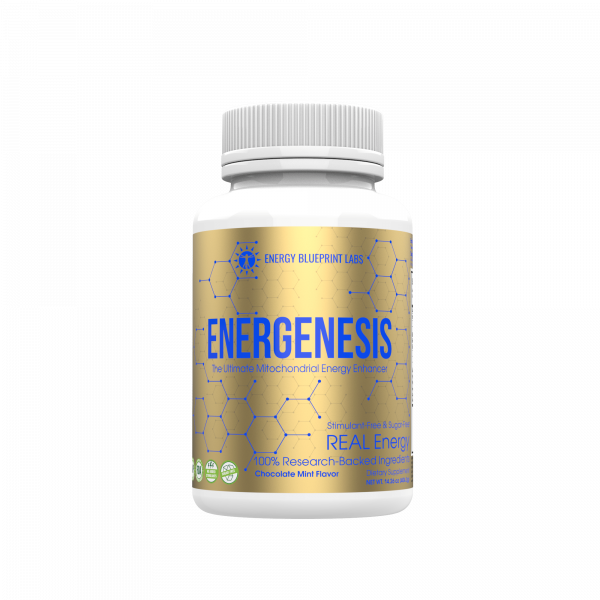
References
- Guerin M, Huntley ME, Olaizola M. Haematococcus astaxanthin: applications for human health and nutrition. Trends Biotechnol. 2003;21:210–6.
- Gruszecki WI, Strzałka K. Carotenoids as modulators of lipid membrane physical properties. Biochim Biophys Acta. 2005;1740:108–15.
- Kidd P. Astaxanthin, cell membrane nutrient with diverse clinical benefits and anti-aging potential. Altern Med Rev. 2011;16:355–64.
- Naguib YM. Antioxidant activities of astaxanthin and related carotenoids. J Agric Food Chem. 2000;48:1150–4.
- Choi HD, Kim JH, Chang MJ, Kyu-Youn Y, Shin WG. Effects of astaxanthin on oxidative stress in overweight and obese adults. Phytother Res. 2011;25:1813–8.
- Wolf AM, Asoh S, Hiranuma H, Ohsawa I, Iio K, Satou A, et al. Astaxanthin protects mitochondrial redox state and functional integrity against oxidative stress. J Nutr Biochem. 2010;21:381–9.
- Yu T, Dohl J, Chen Y, Gasier HG, Deuster PA. Astaxanthin but not quercetin preserves mitochondrial integrity and function, ameliorates oxidative stress, and reduces heat-induced skeletal muscle injury. J Cell Physiol. 2019;234:13292–302.
- Krestinina O, Baburina Y, Krestinin R, Odinokova I, Fadeeva I, Sotnikova L. Astaxanthin Prevents Mitochondrial Impairment Induced by Isoproterenol in Isolated Rat Heart Mitochondria. Antioxidants (Basel) [Internet]. 2020;9.
- Kim SH, Kim H. Inhibitory Effect of Astaxanthin on Oxidative Stress-Induced Mitochondrial Dysfunction-A Mini-Review. Nutrients [Internet]. 2018;10.
- Balić A, Mokos M. Do We Utilize Our Knowledge of the Skin Protective Effects of Carotenoids Enough? Antioxidants (Basel) [Internet]. 2019;8.
- Camera E, Mastrofrancesco A, Fabbri C, Daubrawa F, Picardo M, Sies H, et al. Astaxanthin, canthaxanthin and beta-carotene differently affect UVA-induced oxidative damage and expression of oxidative stress-responsive enzymes. Exp Dermatol. 2009;18:222–31.
- Davinelli S, Nielsen ME, Scapagnini G. Astaxanthin in Skin Health, Repair, and Disease: A Comprehensive Review. Nutrients [Internet]. 2018;10.
- Ito N, Seki S, Ueda F. The Protective Role of Astaxanthin for UV-Induced Skin Deterioration in Healthy People-A Randomized, Double-Blind, Placebo-Controlled Trial. Nutrients [Internet]. 2018;10.
- Chalyk NE, Klochkov VA, Bandaletova TY, Kyle NH, Petyaev IM. Continuous astaxanthin intake reduces oxidative stress and reverses age-related morphological changes of residual skin surface components in middle-aged volunteers. Nutr Res. 2017;48:40–8.
- Tominaga K, Hongo N, Karato M, Yamashita E. Cosmetic benefits of astaxanthin on humans subjects. Acta Biochim Pol. 2012;59:43–7.
- Tominaga K, Hongo N, Fujishita M, Takahashi Y, Adachi Y. Protective effects of astaxanthin on skin deterioration. J Clin Biochem Nutr. 2017;61:33–9.
- Wong SK, Ima-Nirwana S, Chin K-Y. Effects of astaxanthin on the protection of muscle health (Review). Exp Ther Med. 2020;20:2941–52.
- Liu SZ, Ali AS, Campbell MD, Kilroy K, Shankland EG, Roshanravan B, et al. Building strength, endurance, and mobility using an astaxanthin formulation with functional training in elderly. J Cachexia Sarcopenia Muscle. 2018;9:826–33.
- Malmsten CL, Lignell A. Dietary Supplementation with Astaxanthin-Rich Algal Meal Improves Strength Endurance–A Double Blind Placebo Controlled Study on Male Students–. Carotenoid Sci. 2008;13:20–2.
- Fleischmann C, Horowitz M, Yanovich R, Raz H, Heled Y. Asthaxanthin Improves Aerobic Exercise Recovery Without Affecting Heat Tolerance in Humans. Front Sports Act Living. 2019;1:17.
- Djordjevic B, Baralic I, Kotur-Stevuljevic J, Stefanovic A, Ivanisevic J, Radivojevic N, et al. Effect of astaxanthin supplementation on muscle damage and oxidative stress markers in elite young soccer players. J Sports Med Phys Fitness. 2012;52:382–92.




